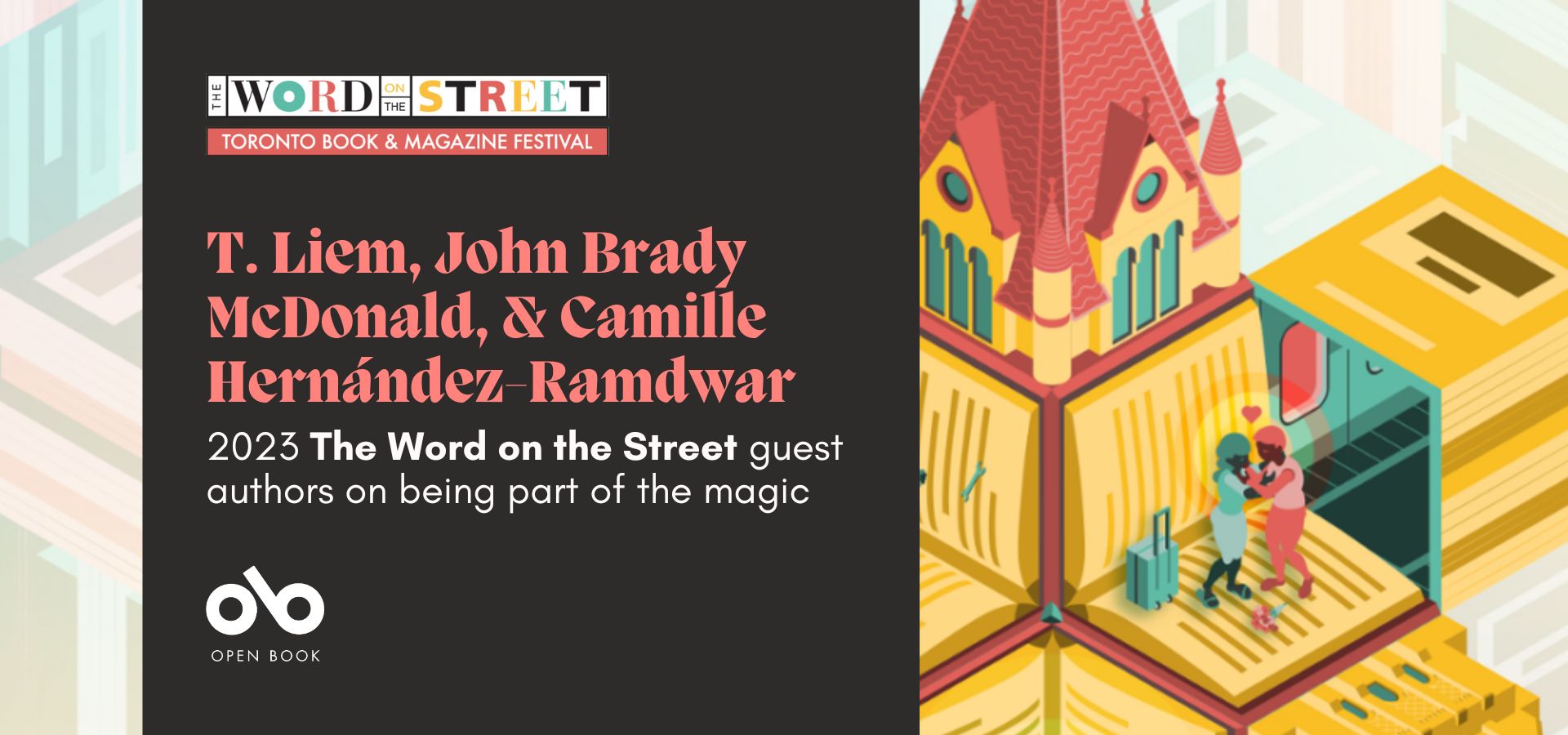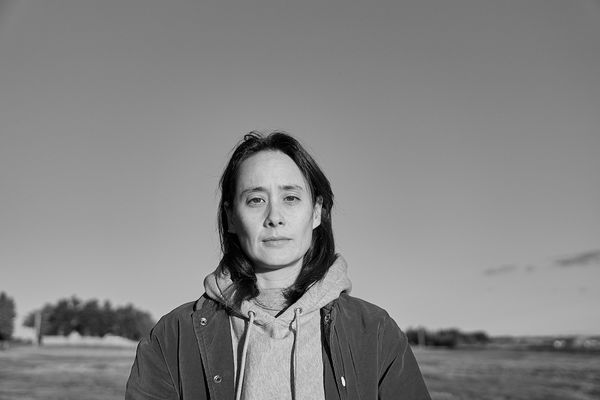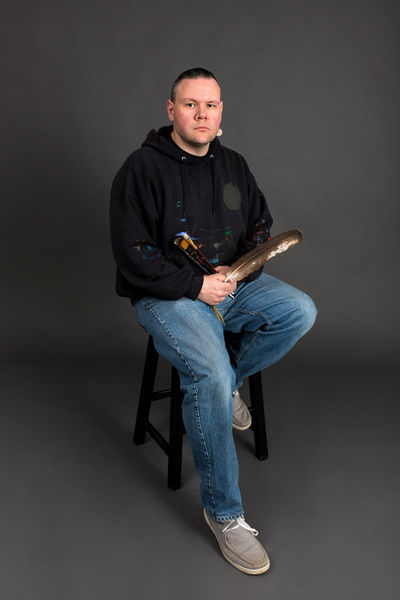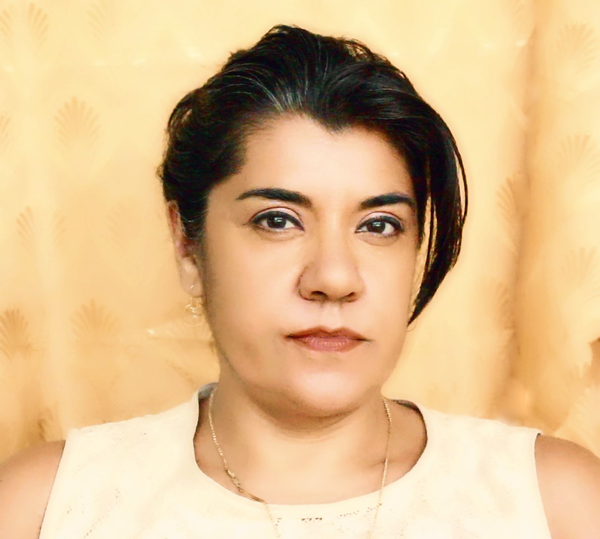Liem, McDonald, & Hernández-Ramdwar: 3 WOTS Guest Authors on What They're Reading at the Festival & Why
This weekend, The Word on the Street will take over Queen's Park in Toronto to bring together over 100 writers and creators for two full days of literary celebrations.
There will be panel discussions, readings, and workshops, as well as dozens of publishers, magazines, and literary organizations forming a massive marketplace, and food vendors offering their wares under the leafy tableaux of the park. The festival, which turns 34 this year, is one of the highlights of the Toronto book year, and we're excited to be speaking with three of WOTS' talented guest authors from the Vibrant Voices tent, a special stage at the festival which celebrates Ontario literature.
T. Liem, the author of Slows: Twice (Coach House Books), John Brady McDonald author of Carrying It Forward: Essays from Kistahpinânihk (Wolsak & Wynn), and Camille Hernández-Ramdwar, author of Suite as Sugar (Dundurn Press) tell us about what they'll be reading and why, and their favourite Ontario books, and the places and experiences of the province that have meant the most to them, from Caribana boat cruises to Toronto rentals with uninvited squirrel guests.
Open Book:
Tell us about the book you’re featuring at The Word on the Street this year and how it came to be.
T. Liem:
My second collection of poetry is Slows: Twice. In brief, I wrote every poem twice. The second half of the book is a revision of the first, or a distortion like a fun house mirror. This structure came from being in a rut. I felt stuck on ideas that felt old, and like I couldn’t generate something new. I started re-writing poems backwards, either word by word, idea by idea, or line by line. This reinvigorated something while also letting me dwell on certain ideas I was exploring about time and my relationship to productivity while living with mental illness. I was also curious about that feeling of estrangement or embarrassment you can feel about things you’ve said (or written) in the past. How can we make space for these different versions of ourselves?
John Brady McDonald:
Carrying It Forward: Essays from Kistahpinanihk is my first nonfiction work, and it came about as a result of a query by Noelle Allen, publisher at Wolsak and Wynn, asking if I had ever considered writing essays. She had been following some of my lengthier posts on social media regarding various Indigenous and social issues, and felt that they would make a powerful and meaningful collection addressing some of the issues facing us as Indigenous people face in the 21st Century.
Camille Hernández-Ramdwar:
My book is Suite as Sugar, a collection of short stories which generally has to do with themes of violence, especially colonial violence and its aftermath and effects on a variety of people (and, in one story, dogs). The stories take place in Canada and the Caribbean. The stories are very different in terms of voice, style, language, and so on, so I would say it is quite an eclectic collection!
I was writing short stories, poetry, and narratives in the 1990s, in my twenties and early thirties, but once I took up a full time professorship in 2003 I stopped creatively writing altogether. It was only during the pandemic that I had the mental space to sit down and carve out the stories which became this collection. Many of the ideas for these stories had been milling around my head for a few years – it was a relief to finally get them out!
Open Book:
How did you pick the passage you’ll be presenting at the festival? What does that segment of your book mean to you?
TL:
What I choose to share is usually the result of my mood that day, but I like to show my attempts to wrangle the self out of despair. Many of these poems represent the attempt to find joy, or reason to live amidst the small and huge effects of climate disaster, war, systemic racism vibrating in foreground and background. With this collection I want to show the repetition of days without being so repetitive that an audience drifts off. Having said that, I am often a drifting audience member, and I think repetition offers a pleasant sort of feeling of deja-vu or familiarity the way the chorus of a song comes back.
Your CanLit News
Subscribe to Open Book’s newsletter to get local book events, literary content, writing tips, and more in your inbox
JBM:
The piece I'll be reading is entitled "Not THAT John A."
I chose this piece as it addresses some of the way humour was used to unsuccessfully mask the trauma of being a Residential School survivor who once carried the name of the man responsible for the genocide of my people, and the journey to face up to the possibility of changing such a fundamental aspect of who I was at a critical point in history.
CHR:
The passage I am reading will be from a story entitled “It’s Lit” which addresses the unaffordable housing crisis in Toronto, gentrification, and how this city is increasingly becoming an impossibility for the unrich. I like this story because it presents a “what if?” scenario – what if the poor, homeless, and otherwise marginalized and oppressed people in Toronto suddenly rose up? What if for once rich people were put on the defensive? In Canada we have never really encountered a scenario like this, but it happens – and I believe will increasingly begin to happen more – in other parts of the world. Perhaps there is a bit of a caveat in this story as well – as Caribbean people like to say “After one time is a next.”
Open Book:
The Vibrant Voices program at The Word on the Street celebrates Ontario authored and published books. Can you tell us about a favourite book, poem, or story by an Ontario-based author that you’ve read?
TL:
One of my favourite books is That Time I Loved You by Carrianne Leung. I love short stories as a form and Leung captures the intricacies of relationships among families and neighbours so well. I remember feeling cared for and seen by this book even though my most familiar neighbourhood is somewhere in Alberta and not Scarborough.
JBM:
It’s an odd choice, but my favourite Ontario-based book is The Tom Thomson Mystery, written by William T. Little in 1970. It’s the first book I ever read about the artist Tom Thomson and his mysterious death in Algonquin Park. This book began my journey of interest in the life and work of the famous artist.
CHR:
Sans Souci by Dionne Brand, which I am so happy to see has now been reprinted by Knopf. I originally read Brand’s debut short story collection in a Caribbean Literature class back at York University in the late 1980s and there are stories in there that have stayed with me ever since (such as “At the Lisbon Plate” and “Train to Montreal”). A masterful, tense, and lyrical look at race, racism, rage, retribution, revolution, and Black/Caribbean life in Canada. Timeless and brilliant.
Open Book:
Is there a place in Ontario that has been inspiring or special to you? If so, what do you love about it?
TL:
Ontario is so big! It’s overwhelming to think about sometimes. My answer feels boring in that the most special place to me, in the whole province—most of which I have not been to—is the house I used to live in in Toronto. It was a huge green duplex with floral wallpaper inside, a squirrel infestation one summer, three cats, and next to huge trees where raccoons would get into fights. My roommate and I used to sit on the porch talking and there was a huge front yard filled with flowers and all sorts of green plants, hiding us while we people-watched.
JBM:
I have always had a soft spot in my heart for the City of Ottawa. It was where I first had the taste of literary recognition upon the stage of the Ottawa International Writers Festival, and the Victorian and Edwardian gothic architecture of the Parliament buildings is something I find fascinating as a historian.
I have also had a love of the quaint, pastoral, almost English rural communities I visited around Guelph when I read at the Eden Mills Writers Festival. I’m an Anglophile, and any place which hints at Britain is a beautiful place to me.
CHR:
Lake Ontario. I was born and grew up in Winnipeg, which is landlocked, with two mighty rivers meeting in the centre of it. But my whole life I longed for the sea, and once I moved to Toronto in 1986 the closest I could come to that was Lake Ontario. Wherever I was in Toronto, I would find myself fleeing to the shore, to any beach, taking the ferry to the Toronto Islands, just to be close to that massive body of water. Caribana in the early days used to terminate at Lake Ontario, and there were the events on the Islands, the whole excitement of boarding the ferry and crossing over to these islands to indulge in “island culture.” And the many many Caribana boat cruises I attended over the years, sailing Lake Ontario with soca and calypso music pumping and the whole boat rocking with the rhythmic movement of bodies, people mad with joy, Caribbean people re-creating ourselves in an often hostile landscape. Living in Toronto and being able to look out my window and see that lake has meant the difference between mental stability and wellness and the opposite of that. Lake Ontario is that significant to me.
____________________________________________________
T. Liem is the author of Obits. (Coach House, 2018), which was shortlisted for a Lambda Literary Award, and won the Gerald Lampert Memorial Award as well as the the A.M. Klein Prize. Their writing has been published in Apogee, Plenitude, The Boston Review, Grain, Maisonneuve, Catapult, The Malahat Review, The Fiddlehead, and elsewhere. Their essay about family and growing up with Indonesian and British heritages, "Rice Cracker," won the Constance Rooke Creative Nonfiction Prize in 2015. They are from Alberta and live in Montreal, Tio’Tia:ke, unceded Kanien’kehá:ka territories.
John Brady McDonald is a Nêhiyawak-Métis writer, artist, historian, musician, playwright, actor and activist born and raised in Prince Albert, Saskatchewan. He is from the Muskeg Lake Cree Nation and the Mistawasis Nêhiyawak. He is the author of several books, and his written works have been published and presented around the globe. He is also an acclaimed public speaker, who has presented in venues across the globe, such as the Ânskohk Aboriginal Literature Festival, the Black Hills Seminars on Reclaiming Youth, the Appalachian Mountain Seminars, the Edmonton and Fort McMurray Literary Festival, the Eden Mills Writers’ Festival and the Ottawa International Writers Festival. A noted polymath, John lives in Northern Saskatchewan.
Camille Hernández-Ramdwar is a multi-racial, multicultural, multilingual, and transnational writer and scholar. The veil between the corporeal and the incorporeal is very thin in her work, which explores the search for belonging; the collective violences of neo-colonialism, poverty, racism, sexism, and other injustices; and the important interrelationship between matter and spirit. She divides her time between Toronto and Trinidad and Tobago.






